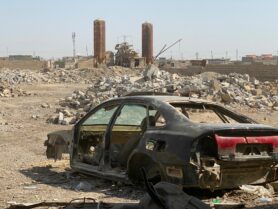On January the 18th United States’ Pentagon spokesperson Sabrina Singh was asked a question that took her by surprise. That day the United States (US) and its partners had conducted their fifth round of airstrikes against the Houthi’s in Yemen.
Since November, the Houthi militants have targeted several international commercial ships in the Red Sea in response to Israel’s attack in Gaza. Thus far, thirty ships have been attacked with one ship hijacked and its crew still being held hostage in a port in Yemen. Not all these ships had obvious, or any, ties to Israel. Because the Red Sea, the narrow Bab-al Mandeb Strait and the Gulf of Aden are part of the key trade route linking Asia, West Asia, and Europe, the attacks have severely hampered international trade.
The US, United Kingdom, and allies started retaliatory strikes on January 11 to destroy military targets in Yemen, including missile launchers, air defence systems, radars, and weapon storages. According to Singh, these ‘defence actions’ were taken to ‘protect freedom of navigation and prevent attacks on the US and partner maritime traffic’.
So, when Deputy Pentagon Press Secretary Sabrina Singh opened the press briefing on January 18, it was the fifth day of US military airstrikes on Yemeni territory. The briefing is well under way, when Idrees Ali, from Reuters, asks: ‘Is it now fair to say that the US is at war in Yemen?’
‘[N]o, we don’t seek war,’ Singh replies. ‘We don’t think that we are at war. We don’t want to see a regional war.’ She goes on to explain that what the US and partners are doing is self-defence, to prevent a regional war and to protect the world’s commerce.
The press corps questions that follow concern the level of sophistication of Houthi capabilities and the recent hospitalisation of the US Secretary of Defence. Then Singh takes a question from Lara Seligman, reporter for Politico. ‘Just a follow-up on Idrees’ question. You said that we are not at war with the Houthis,’ she starts. ‘[B]ut if… you know, this tit-for-tat bombing… we’ve bombed them five times now. So if this isn’t war, can you just explain this a little bit more to us? If this isn’t war, what is war?’
What is war? Such a shockingly simple question that seems easily forgotten once we all get entangled in the web of war-making. When we start discussing weapon types, military targets, and whether the Secretary had purposely kept the White House in the dark about his medical treatment – these fundamental questions get overlooked. And Seligman sounded genuinely curious, she clearly did not have the answer. As if she had just taken one step back, added up the numbers and facts, and came to the conclusion that: this must be war, right? If not, what is?
When Sabrina Singh replies to Seligman, she seems flustered. ‘Sure, Lara, sure. Great question, I just wasn’t expecting it phrased exactly that way. Look, we are… we do not seek war. We are… we do not… we are not at war with the Houthis. In terms of a definition, I think that would be more of a clear declaration from the United States.’ In other words, military engagement in Yemen isn’t a war until it is heralded as such a formal declaration.
If Singh refers here to an US Declaration of War as a threshold for war, she sets the bar for war extremely high. For reference, the last time the US formally declared war, in such terminology, was to Bulgaria, Hungary and Romania in 1942.
Singh continues: ‘But again, what we are doing and the actions that we are taking are defensive in nature. I would… I turn back to the fact that there have been over 30 attacks by Houthis on 50 different nations that are transiting the Red Sea at this time.’ She introduced us to a bit of defensive reasoning: If it looks like a war, escalates like a war, and sounds like a war, then it probably is a US self-defence action. Semantics to steer clear of political accountability and negative public opinion.
She obviously had her instructions from White House lawyers to refrain from stating the armed engagements constitute war. In the US, congress has the sole ability to declare war. The President is Commander in Chief, and in order to keep the checks and balance system in place Congress needs to control their power. So, if this military action were to be called war, congress will be in an uproar over the fact they have not – and likely will not – permit it.
At the same time, not framing the conflict as war is actually also beneficial for Congress. As long as the President does not ask permission, the members of Congress do not have to take a formal position. This protects them from making a risky bet on the future outcomes and public opinion: what if you support an unsuccessful war, or oppose a popular one? As a consequence of these dynamics, a president not asking congressional approval for military action might have become one of the longest standing traditions in American politics. Between 1942 and 2023, the US under Presidents from both sides of the aisle have used armed force no less than 243 times.
Another reason why Sabrina Singh will not call this a war is the impact it will have on public opinion. It’s a matter of sanitising the language surrounding conflict and war in order to make it socially acceptable. It is beneficial for the administration to use any term but ‘war’ because it figures differently in the imagination of people. The American people may be in favour of ‘military action against the Houthi rebels’ but they will likely be opposed to ‘another Middle East war’. The binary of war is peace, but who knows what the opposite of a defence action is?
That same day, President Biden was asked whether the strikes against the Houthis were working. His response: “When you say working, are they stopping the Houthis? No. Are they going to continue? Yes.”
As of the time of this writing, more than three months after the initial strikes, the US and Houthis are still attacking one another sporadically. Until the day comes that fighting stops, hopefully more journalists will challenge spokespeople and policymakers alike with the obvious questions. Not just to hold governments accountable for their acts of violence abroad – but also for the language they use to justify them.
Read the full press briefing here:
Image source: US Department of Defence. The launch of an F/A-18F Super Hornet fighter jet, attached to the “Fighting Swordsmen” of Strike Fighter Squadron 32, during flight operations aboard the aircraft carrier USS Dwight D. Eisenhower in the Red Sea, Nov. 5, 2023.



